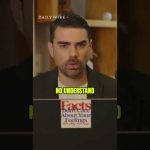In a world often marked by chaos and uncertainty, the recent headlines surrounding government responses to local crises reflect deeper historical lessons about self-reliance and skepticism of authority. A recent discussion highlighted concerns regarding a supposed militia in North Carolina, which turned out to involve just a single individual expressing discontent over federal presence in his community. This situation sheds light on the palpable tension between citizens and their government, reminiscent of America’s foundational beliefs.
For much of America’s history, the spirit of self-reliance has been woven into the very fabric of society. The founders of this nation were deeply skeptical of centralized authority, having fought against what they perceived as tyranny. They understood that government, while necessary for order, could easily become a source of oppression. This distrust was evident in the revolution against Great Britain, where colonists banded together to protect their freedoms. Today, similar sentiments arise whenever federal agencies, such as FEMA, step in during local emergencies. Many citizens question the motives and effectiveness of these agencies, preferring to lean on their communities in times of need.
The commentator on the talk show touched on an important point when referencing the emotional toll on local government employees during crises. Many of these workers are young and have joined to help their communities, yet they often face unwarranted backlash due to the actions of political leaders above them. It serves as a reminder that, while officials may make poor decisions that prompt community skepticism, the individuals employed by these agencies typically earnestly wish to make a positive impact. Still, the conversation urges communities to think critically about the motivations of those in power. Trust must be earned, and skepticism should remain a healthy part of the citizen’s toolkit.
In reflecting upon past events, it becomes apparent that local initiatives often overshadow federal assistance in effectiveness. The anecdote about Texas during the 1920s illustrates how quickly communities can rally to care for their own. In times of disaster, Texans took matters into their own hands, raising funds more effectively than the government could manage. Similarly, the famous defense of New Orleans in the War of 1812 illustrates how citizens, united in a common cause, were able to repel an invading force without relying solely on military support from the federal government.
Additionally, the talk show conversation emphasized the growing role of volunteers and local organizations in disaster recovery efforts. Organizations like the Cajun Navy, which assist those in need during crises, embody the spirit of community self-reliance. Armed with grassroots support and local knowledge, these groups often step in where government fails to act swiftly or effectively. As the discussion indicated, when ordinary citizens come together, they are capable of extraordinary things. This principle harkens back to the American ethos: communities should be prepared to stand for themselves, especially when they believe outside help may be lacking.
The evolving relationship between citizens and government calls for a reevaluation of expectations in times of crisis. By fostering a spirit of collaboration among local organizations, while remaining vigilant towards federal policies, communities can achieve a balance that encourages self-sufficiency without forsaking available assistance. In times of challenge, the strongest communities are those that remember their history, uphold their skepticism, and take charge of their own destinies while extending a hand to their neighbors in need.




